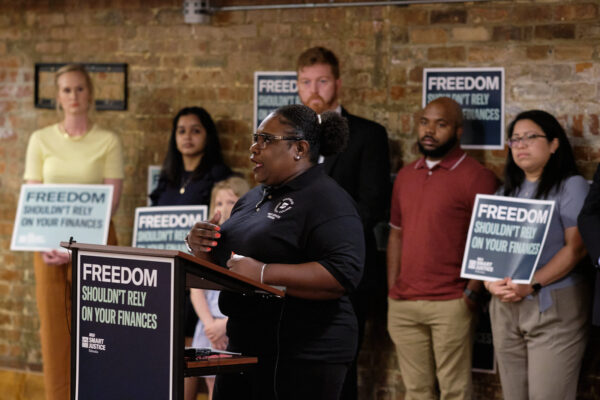LINCOLN, Neb. – The American Civil Liberties Union (ACLU) of Nebraska released a new report today that raises concerns about the impact of court practices on financially struggling Nebraskans. Along with the release of the data, the ACLU of Nebraska is promising action.
The report’s title is “Broken Rules: Laws Meant to Prevent Debtors’ Prisons are Failing Nebraskans.” It describes findings of a two-year accountability project. ACLU of Nebraska staff and interns observed 1,700 sentencing hearings and more than 600 bail hearings in Douglas and Lancaster Counties to evaluate compliance with state laws that are meant to protect Nebraskans who cannot afford to post cash bail or pay fines and fees.
The civil rights organization says the effort identified systemic issues in both counties.
Among the findings:
- Judges assigned cash bail more than any other option. Of 501 observed cases in which a judge did not find an individual to be dangerous or a flight risk, judges only released 18% of those people on their own recognizance.
- Judges often did not ask about financial ability to afford cash bail. Since 2017, state law has required judges to consider a person’s ability to pay cash bail and to impose the least burdensome condition that will reasonably assure that person appears at future court hearings and will minimize any risk to the community. In 38% of observed cases, judges did not ask about ability to pay and in most of those hearings, the public defender never brought it up.
- Judges frequently failed to advise Nebraskans of their rights in regard to fines and fees. Across 1,700 observed sentencing hearings, judges advised that Nebraskans could present information on their ability to pay in just 59% of cases. Judges advised on the right to request payment plans, community service or a waiver of the fines and fees in fewer than half of all cases.
ACLU project leader Demetrius Gatson said the trends should concern all Nebraskans.
“Freedom should not depend on how much money someone has, and there is no difference between a $500 bail and a $2 million bail if someone cannot afford it,” Gatson said. “Today, despite laws that are meant to protect us, Nebraskans are still being confined in jail and suffering the collateral consequences because they cannot afford cash bail or a fine and because they do not know their rights.”
ACLU of Nebraska Legal Director Mindy Rush Chipman said the report’s release marks the end of the team’s first phase of work on the project and the beginning of a second phase.
“We are turning focus from investigating the issue to implementing solutions,” Rush Chipman said. “Our report recommends achievable and meaningful changes, some of which the courts could easily integrate into current practices to better protect and respect Nebraskans’ rights. This work will be moving on several fronts, and we will not be satisfied until our system truly provides justice for all.”
The report recommends implementation of judicial bench cards to guide proceedings (view ACLU examples) and new judicial training to ensure that judges are fully following the letter and intent of the law. It also recommends new legislative action to expand presumptive release policies, require more transparency from prosecutors’ offices and eliminate cash bail in Nebraska.
The ACLU of Nebraska says court accountability is a priority under its Campaign for Smart Justice and racial justice work plan. People being confined pretrial typically make up a large majority of Douglas and Lancaster Counties’ jail populations and Nebraskans of color are often overrepresented in both jails. The report cites data provided by the jails this fall showing that 69% of the Douglas County Jail’s pretrial population and 53% of Lancaster County Jail’s pretrial population were made up of people of color. In both counties, fewer than a third of all residents are people of color. Black Nebraskans were most overrepresented in both jails.
Generous support from the Woods Charitable Fund and the Omaha Community Foundation helped cover the cost of the court observation project and analysis by the University of Nebraska - Lincoln’s Legal Decision Making Research Lab. The ACLU of Nebraska said it will be partnering with the lab again in 2023 on related efforts.
Stay Informed
Sign up to be the first to hear about how to take action.
By completing this form, I agree to receive occasional emails per the terms of the ACLU’s privacy statement.
By completing this form, I agree to receive occasional emails per the terms of the ACLU’s privacy statement.

